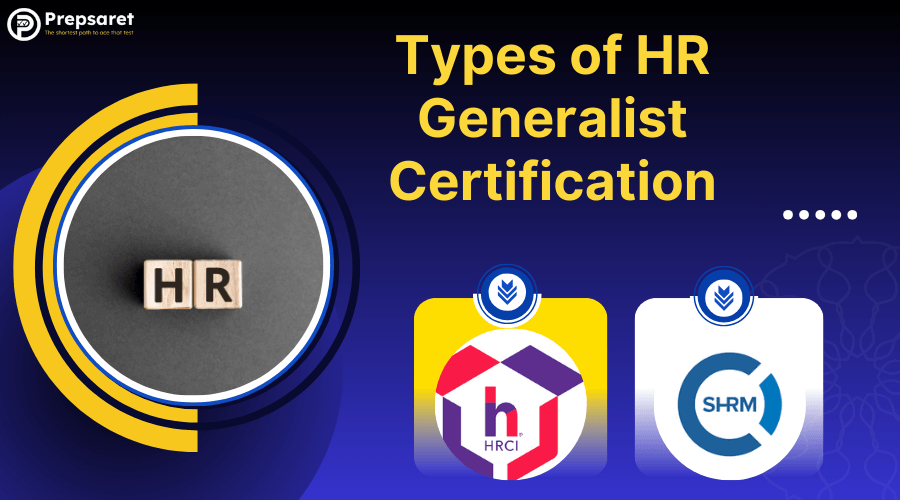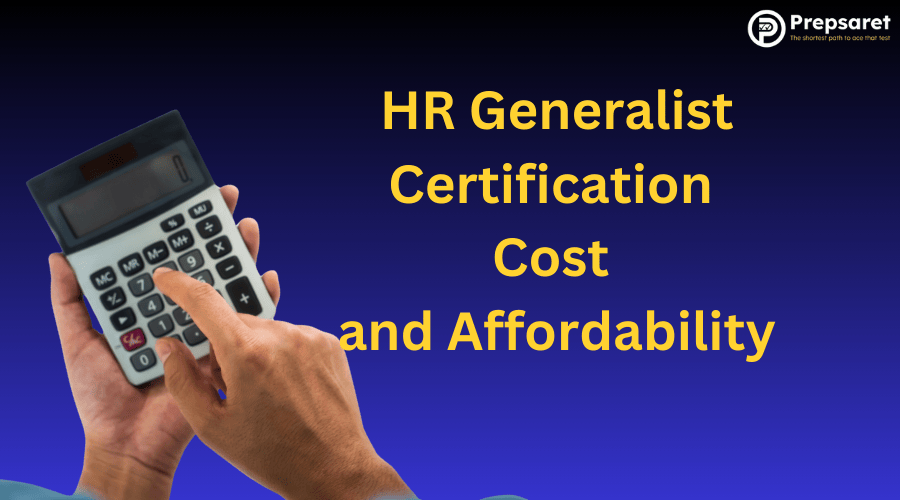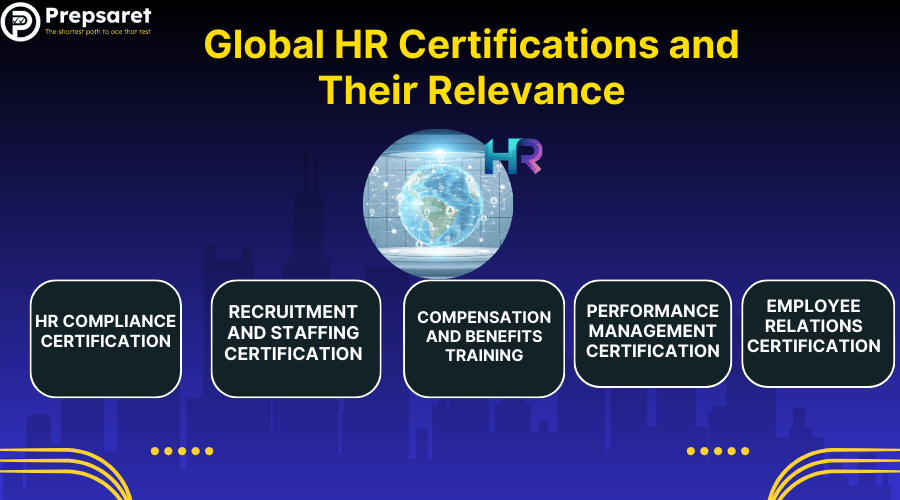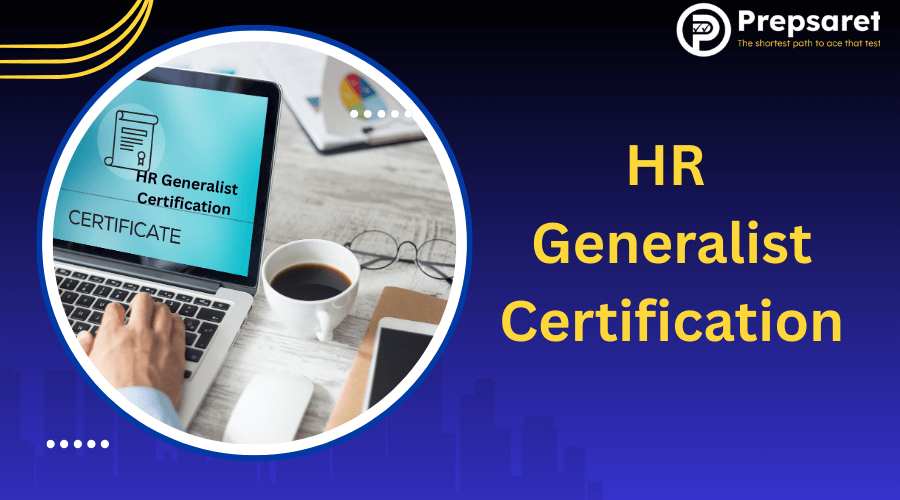Are you looking to advance your career in human resources? An HR generalist certification might be just what you need to take that next big step! Whether you’re just starting in HR or looking to formalize your years of experience, getting certified can open doors to exciting opportunities.
The world of HR is constantly evolving, and staying current with industry standards is crucial. To prepare for your certification, access effective study materials for both HRCI and SHRM certifications at Prepsaret.com.
Now, let’s explore everything you need to know about HR Generalist certification- from what it is, to the different types available, and how it can transform your career path!
What is a HR Generalist Certification
An HR generalist certification validates your knowledge and skills across the broad spectrum of human resources functions.
Unlike specialized certifications that focus on specific HR areas, an HR generalist certification online demonstrates your proficiency in multiple disciplines – from recruitment and onboarding to employee relations, compensation, benefits, and compliance.
These credentials are increasingly sought after by employers who value HR professionals with comprehensive knowledge of the entire employee lifecycle.
Many HR generalist certification programs combine theoretical knowledge with practical applications, ensuring you’re well-prepared to handle real-world HR challenges.
The beauty of these certifications is that they:
- Demonstrate your commitment to the HR profession
- Validate your knowledge across multiple HR disciplines
- Show potential employers you’re serious about your career
- Help you stay current with evolving HR practices
- Provide a competitive edge in the job market
Most certifications require a combination of education, experience, and passing an examination. The good news is that with the rise of digital learning, you can now pursue many HR generalist certification online options that fit your schedule and learning style.
Types of HR Generalist Certification

When exploring your certification options, you’ll discover several paths to choose from. The most widely recognized certifications come from established professional organizations, with SHRM HR generalist certification being among the most prestigious.
Top HR Generalist Certification Options:
SHRM HR Generalist Certification:
- SHRM-CP (Certified Professional): Ideal for operational roles, focusing on HR principles and practices.
- SHRM-SCP (Senior Certified Professional): Suitable for strategic roles, emphasizing leadership and business acumen.
HR Certification Institute (HRCI) Certifications:
- aPHR Certification (Associate Professional in HR): Entry-level certification for those new to HR.
- PHR (Professional in Human Resources): For HR professionals with some experience.
- SPHR (Senior Professional in Human Resources): Aimed at HR leaders with significant experience.
Other Certifications:
- Global Professional in Human Resources (GPHR): Designed for HR professionals working in multinational environments.
- Certified Human Resource Generalist (CHRG): An intermediate-level certification linking theory with practical HR practices.
- International Foundation of Employee Benefit Plans (IFEBP): Offers the CEBS certification
- World at Work: Provides specialized certifications in compensation and benefits
Many HR generalist certification programs cater to different experience levels and career stages. If you’re on a tight budget, you might consider HR generalist certification free resources that provide introductory knowledge.
While these free options typically don’t result in industry-recognized credentials, they can be a great starting point to determine if pursuing a full certification is right for you.
For those seeking structured education without committing to a full certification, numerous HR generalist certificate programs like prepsaret offer focused learning experiences. These programs often serve as stepping stones to more comprehensive certifications or provide targeted knowledge in specific HR areas.
Factors to consider when selecting an HR generalist certification.
- Your current career stage and experience level
- Your professional goals and desired specialization
- Recognition of the certification in your industry or target companies
- Time commitment and preparation requirements
- Investment required for both the certification and ongoing maintenance
Remember that the best certification for you depends on your specific situation and career objectives. Some professionals even pursue multiple certifications to demonstrate expertise across different HR domains.
Check Out: HRCI vs SHRM
HR Generalist Certification Cost and Affordability

One question many HR professionals ask is: “Is HR certification worth it?“ When weighing this decision, it’s important to consider both the costs and potential returns on your investment.
The costs associated with HR certifications can vary significantly based on:
- Certification Body: Different organizations, such as SHRM and HRCI, have varying fee structures.
- Exam Fees: These vary by certification and membership status.
- Study Materials and Preparation Courses: Additional resources like study guides and practice exams add to the overall cost.
- Recertification Requirements: Ongoing costs for maintaining certification.
- Membership Status: Being a member of the certifying organization can reduce costs.
Exam Fees for Popular HR Certifications
- SHRM Certification Cost: Exam fees range from $300 to $475 for members and $400 to $575 for non-members.
- HRCI Certification Cost: Fees generally fall between $300 and $495, depending on the specific certification and membership status.
Check Out:
Beyond the exam fees, many professionals invest in:
- Study guides ($50-$150)
- Practice exams ($30-$100)
- Preparation courses ($500-$1,500)
- Application fees ($75-$100)
When determining if HR certification is worth it, consider these potential benefits:
- Salary Premium: Certified HR professionals often earn 5-20% more than their non-certified peers
- Career Advancement: Many senior HR positions require or strongly prefer certification
- Credibility: Certification demonstrates your commitment and expertise to employers and colleagues
- Job Security: In competitive markets, certification can give you an edge in retention
- Knowledge Enhancement: The preparation process itself builds valuable skills
Return on Investment
For many professionals, certification costs are offset within 1-2 years through higher compensation. Additionally, many employers offer tuition reimbursement or certification support programs, making the investment even more affordable.
Pursuing an HR generalist certification can be a strategic career move, offering both financial and professional benefits.
By understanding the costs and potential returns, you can make an informed decision about whether certification aligns with your career goals.
HR Generalist Certification Renewal Requirements
Earning your HR generalist certification is just the beginning of your professional journey. To maintain your credential, you’ll need to understand the HR certification renewal requirements specific to your certification body.
Most HR certifications require renewal every 2-3 years and involve:
- Earning a specified number of continuing education credits
- Paying recertification fees
- Documenting professional development activities
- Potentially retaking exams if deadlines are missed
For example, SHRM requires 60 Professional Development Credits (PDCs) every three years, while HRCI typically requires 60 recertification credits during a similar timeframe.
Check Out: PHR Certification Renewal
Activities that typically qualify for recertification credits include:
- Attending conferences and seminars
- Completing continuing education courses
- Participating in webinars and workshops
- Teaching HR-related courses
- Publishing articles or research in HR publications
- Volunteering with HR organizations
Planning your professional development strategically can make the renewal process much smoother. Many professionals create a three-year development plan that aligns with both their career goals and renewal requirements.
By staying proactive about your renewal, you’ll ensure your certification remains current while continuing to build valuable skills that enhance your effectiveness as an HR professional.
Best HR Generalist Certifications

With numerous options available, identifying the best HR certifications can feel overwhelming. The “best” certification for you depends on your career stage, industry, and professional goals.
For those new to the field, several best HR certification for beginners options provide accessible entry points:
- HRCI’s aPHR (Associate Professional in Human Resources): Requires no experience and focuses on foundational knowledge
- SHRM-CP with minimal experience: Accessible to early-career professionals with a degree
- ATD’s CPTD (Certified Professional in Talent Development): Focuses on training and development aspects of HR
For mid-career professionals, the most respected HR generalist certification options include:
- SHRM-CP: Recognized globally and focuses on practical application
- PHR (Professional in Human Resources): Strong focus on U.S. regulations and operational HR
- IPMA-CP (Certified Professional): Public sector focus with strong governmental recognition
Senior HR leaders often pursue:
- SHRM-SCP: Advanced strategic certification from SHRM
- SPHR (Senior Professional in Human Resources): HRCI’s strategic-level certification
- GPHR (Global Professional in Human Resources): Ideal for international HR roles
When evaluating which HR generalist certification is best for you, consider:
- Recognition: Which certifications do employers in your target industry value most?
- Content Alignment: Which certification best matches your daily work or career aspirations?
- Network Benefits: Which certification provides access to the most valuable professional community?
- Preparation Requirements: Which certification’s study process will build the skills you most need?
- Maintenance Demands: Which certification’s renewal requirements align with your professional development goals?
Many HR professionals find that combining complementary certifications (such as a general HR certification plus a specialized one) creates a powerful credential package that highlights both breadth and depth of expertise.
How to Get HR Generalist Certification
Ready to pursue your certification? The path to earning an HR generalist certification typically follows these steps:
- Research and Select: Choose the certification that best aligns with your career goals
- Check Eligibility: Review education and experience requirements
- Apply: Complete application forms and pay applicable fees
- Prepare: Study for the examination
- Take the Exam: Complete and pass the certification test
- Maintain: Fulfill ongoing requirements to keep your certification active
Many professionals opt for online HR certification programs due to their flexibility and accessibility. These programs allow you to learn at your own pace while balancing work and personal commitments.
Various HR certification programs offer different preparation approaches, including:
- Self-study using official guides and practice exams
- Instructor-led virtual courses
- In-person boot camps and intensive preparation sessions
- University-affiliated certificate programs
For comprehensive skill development, HR generalist training programs cover the full spectrum of human resources functions. These programs typically include modules on:
- Recruitment and selection
- Compensation and benefits
- Employee relations
- Performance management
- HR compliance
- HRIS and HR analytics
- Employee development
Remember that Prepsaret offers self-study programs specifically designed to help students prepare for HR certifications for both the HRCI and SHRM.
Their materials are structured to cover all exam content areas while providing practice questions that mirror the actual certification exams.
When creating your preparation plan, consider:
- Your learning style (self-directed vs. structured)
- Available time for study
- Budget constraints
- Preferred learning format (reading, video, interactive)
- Timeline for certification
Most successful candidates spend 3-6 months preparing for their certification exam, dedicating 5-15 hours weekly to study and practice.
HR Generalist vs. HR Specialist Certification
Understanding the difference between HR generalist vs. HR specialist certification can help you make an informed decision about your career path.
An HR generalist certification validates broad knowledge across multiple HR functions, while specialist certifications focus deeply on a single area such as compensation, benefits, or talent acquisition.
The table below highlights key differences:
| Aspect | HR Generalist | HR Specialist |
| Knowledge Breadth | Wide coverage across all HR functions | Deep expertise in one area |
| Career Flexibility | Greater role versatility | More limited to specific function |
| Advancement Path | Often to HR management | Typically to function leadership |
| Typical Work Environment | Smaller organizations where one person handles multiple HR functions | Larger organizations with specialized departments |
Essential HR generalist skills include:
- Communication across all organizational levels
- Knowledge of employment law and compliance
- Recruiting and talent acquisition
- Benefits and compensation administration
- Employee relations
- HRIS system management
- Training and development
- Organizational development fundamentals
The generalist path offers significant advantages for those who:
- Enjoy variety in their daily work
- Want exposure to multiple aspects of the business
- Prefer working in smaller organizations
- Desire flexibility to move between different HR roles
Many HR professionals start with an HR generalist certification to build a solid foundation before potentially specializing later in their careers. This approach provides maximum career flexibility while keeping multiple advancement paths open.
Benefits of HR Generalist Certification
The advantages of earning your certification extend far beyond simply having credentials to list on your resume. Understanding these HR certification benefits can help motivate you through the preparation process.
Career-focused benefits include:
- Better Job Prospects: Many employers filter candidates based on certification status
- Higher Earning Potential: HR generalist salary with certification is typically 5-20% higher than uncertified peers
- Faster Advancement: HR generalist certification for career growth creates a clear demonstration of your expertise and commitment
- Greater Job Security: Certified professionals are often last to be cut during downsizing
- Increased Mobility: Certifications are recognized across industries and regions
Professional development benefits include:
- Knowledge Enhancement: The study process builds your expertise across HR domains
- Confidence Boost: Certification validates your capabilities
- Network Access: Most certification bodies provide valuable professional connections
- Continuing Education: Renewal requirements ensure you stay current with HR trends
- Respect from Colleagues: Certification demonstrates your commitment to excellence
According to a recent industry survey, 96% of certified HR professionals report that certification has positively impacted their career, with benefits including:
- Promotion within 12 months (37%)
- New job offer (28%)
- Expanded responsibilities (63%)
- Salary increase (41%)
These statistics strongly support the value of HR generalist certification for career growth as a strategic career investment.
Check Out: Top HR Jobs You Can Get with SHRM Certification
Advanced HR Certification Opportunities
As your career progresses, you may consider pursuing advanced credentials beyond your initial HR generalist certification. These advanced options can help you develop specialized expertise or prepare for leadership roles.
HR leadership certification programs focus on strategic aspects of human resources and typically require significant experience. These credentials demonstrate your ability to align HR initiatives with organizational objectives and drive business results through people strategies.
Here are the most recognized HR certifications:
- SHRM-CP certification (and its senior-level counterpart, SHRM-SCP) takes a behavioral competency approach that emphasizes application of HR knowledge in real-world situations. The certification focuses on both technical knowledge and people management skills required for HR leadership.
- PHR certification (Professional in Human Resources) provides comprehensive validation of operational HR knowledge with an emphasis on U.S. regulations and practices. Its advanced counterpart, the SPHR, focuses on strategy and policy development.
Other notable advanced certifications include:
- CHRO Certification: For chief human resource officers and those aspiring to the role
- Certified HR Executive (CHRE): Focused on executive-level HR leadership
- Global HR certifications: For those working in multinational environments
When selecting an advanced certification, consider:
- Your long-term career aspirations
- The specific knowledge gaps you need to fill
- The recognition of the certification in your target industry
- The investment required versus potential returns
Many HR professionals create a certification roadmap that builds strategically from foundational credentials to specialized or leadership-focused certifications.
This progressive approach allows you to continually expand your expertise while demonstrating ongoing professional development to employers.
HR Certification for Promotions and Career Growth
One of the most compelling reasons to pursue certification is the impact it can have on your professional trajectory. HR certification for career growth is a strategic investment that can yield significant returns throughout your career.
Research consistently shows that HR certification for promotions creates a competitive advantage. According to industry studies:
- HR Assistants: 82% of certified professionals report being promoted in the past five years, compared to 68% of those without certification.
- HR Directors: Certified directors have a 25% higher chance of being promoted compared to non-certified directors.
The certification advantage typically manifests in several ways:
- Eligibility for Advanced Roles: Many senior positions list certification as a requirement
- Competitive Differentiation: When candidates have similar experience, certification often becomes the deciding factor
- Internal Recognition: Certification signals your commitment to the organization and profession
- External Opportunities: Improved visibility to recruiters and hiring managers
HR generalist job opportunities for certified professionals span various industries and organization types. Some of the fastest-growing areas include:
- Technology companies seeking HR business partners
- Healthcare organizations facing complex staffing challenges
- Consulting firms providing HR advisory services
- Government agencies needing compliance expertise
- Startups building their first HR infrastructure
To maximize HR certification for career growth, consider these strategies:
- Add your certification prominently to your resume, LinkedIn profile, and professional bio
- Join certification-specific networking groups to connect with fellow credential holders
- Volunteer for projects that allow you to apply your certified knowledge
- Mentor others pursuing certification to strengthen your own knowledge
- Seek opportunities to apply advanced concepts from your certification studies
By integrating your certification into your professional brand and consistently demonstrating the knowledge it represents, you position yourself for continued advancement throughout your HR career.
Global HR Certifications and Their Relevance

In our increasingly interconnected world, understanding global HR certifications and their applications is essential for career mobility and effectiveness in international organizations.
While some certifications are recognized worldwide (such as SHRM credentials), others have regional significance or focus on specific aspects of international HR practice. Consider these specialized certifications based on your career focus:
- HR compliance certification validates your knowledge of regulatory requirements across different jurisdictions – particularly valuable for multinational organizations navigating complex legal environments
- Recruitment and staffing certification focuses on global talent acquisition strategies, cross-border hiring, and international onboarding practices
- Compensation and benefits training addresses global remuneration strategies, expatriate packages, and international benefits administration
- Performance management certification covers culturally adaptive approaches to evaluating and developing talent across borders
- Employee relations certification focuses on managing diverse workforces and navigating different cultural expectations around the employer-employee relationship
The relevance of these certifications varies by:
- Region: Some certifications have stronger recognition in specific geographic areas
- Industry: Certain sectors place higher value on international credentials
- Organization Type: Multinational companies typically value global certifications more highly
- Role Focus: Positions with international responsibilities benefit most from global credentials
When evaluating global certifications, consider:
- The jurisdictions where you plan to work
- The transferability of the credential across borders
- The certification body’s international reputation
- The alignment with your international career goals
For HR professionals with global aspirations, combining a strong HR generalist certification with one or more internationally-focused specialized credentials creates a powerful qualification package that demonstrates both breadth and global sophistication.
FAQs
How Do I Become An HR Generalist?
To become an HR generalist, gain experience in HR roles, obtain a relevant degree, and consider certifications like SHRM-CP or PHR.
Is It Worth Getting An HR Certificate?
Yes, HR certificates enhance career prospects, increase earning potential, and demonstrate expertise.
How Much Does A PHR Certification Cost?
The PHR exam fee is $395, with additional costs for preparation courses.
Who Gets Paid More HR Generalist Or HR Specialist?
Generally, HR specialists with deep expertise in a specific area may earn more than HR generalists.
Can You Get A Job In HR With Just A Certificate?
Yes, a certificate can help secure entry-level HR positions, especially when combined with relevant experience or education.
Conclusion
Embarking on your HR Generalist certification journey is a crucial step in advancing your career. It validates your knowledge and enhances your skills, making you more effective in HR roles. Proper preparation is essential, and quality study materials like those offered by Prepsaret can boost your chances of success.
Whether you choose HRCI vs. SHRM certification or another credential, Prepsaret provides the resources to help you confidently achieve your goals. Start your journey today and unlock your potential in HR!

